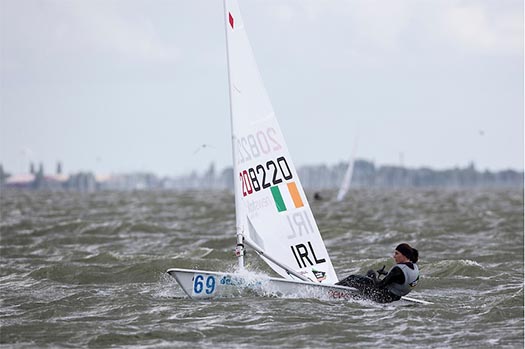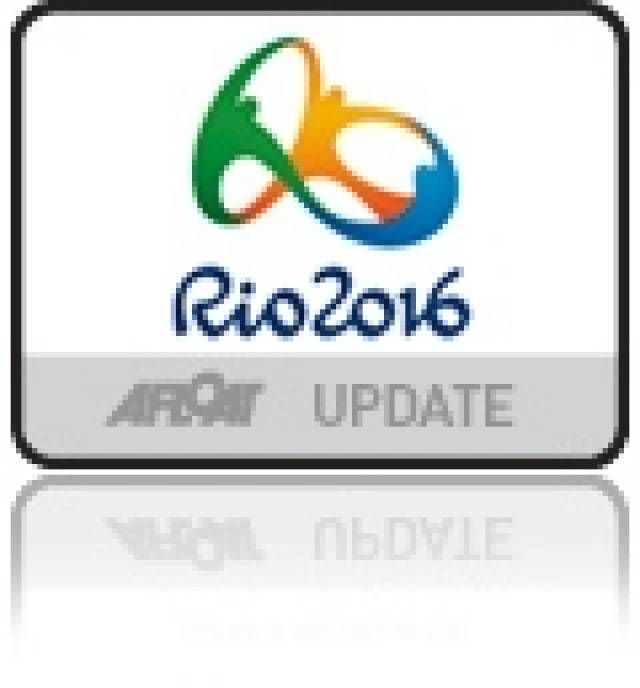#sailDLR2015 – Ten Irish Laser sailors are fighting for two places at this year's Olympic test event in Rio in August but it is the London 2012 incumbents who are producing the results on a windy day one of an Irish trial, sailed as part of the massive 700–boat Delta Lloyd regatta in Holland.
Dun Laoghaire's Annalise Murphy, sailing in her optimum conditions, opened her Dutch account with a first and a third to be fourth overall, putting down a marker to would be rivals Aisling Keller, Aoife Hopkins, Erica Ruigrok and Nicole Hemeryck.
Belfast mens Laser ace James Espey had a solid first day on the Ijsselmeer with an eighth and an eighth scored to put him 12th overall. Next best to Espey is Schull's Fionn Lyden in 48th. Chris Russell, Finn Lynch and Darragh O'Sullivan are also racing.
The selection rules say the Irish sailor ranked the highest at the conclusion of this week shall be recommended for Aqueece Rio in August.
Full results here
It was a strong-wind opening day for the 700 boats competing at the Delta Lloyd Regatta in Medemblik, Holland.
Poland's world-class windsurfing squad has always enjoyed the strong breeze, and Pawel Tarnoski leads the RSX men's windsurfer division after a perfect day of three race victories. Zofia Noceti-Klepacka leads the RSX women's division with scores of 2,1,2.
In the women's skiff, the 49er FX, Dutch team Annemieke Bekkering and Annette Duetz blasted around the course with incredible consistency, racking up 3,3,3 to lead the regatta, although the Aussie team in 2nd place, Tess Lloyd and Caitlin Elks, also sit on 9 points with scores of 1,4,4.
It's a similar tie-break story at the top of the men's 49er leaderboard; New Zealand's young team of Marcus Hansen and Josh Porebski hold the lead in the men's skiff fleet, but on equal points in 2nd place is Australia's Joel Turner and Lewis Brake. Near the back of the fleet, but not surprising after their first day ever of competition in the highly challenging 49er, is the team from Oman, Musab Al Hadi and Hashim Al Rashdi. "If we can get round the course, and not crash into anyone, we'll be happy," said Al Hadi, although he was disappointed to finish outside the time limit of the final of their three heats, after multiple capsizes on the last leg of the race.
Part of the challenge of racing on the IJsselmeer is that the shallow 5-6m waters generate a short choppy wave pattern that makes it very easy to stick the nose of a fast boat like the 49er into the back of the wave, resulting in pitchpoles and capsizes. It's a similar problem for the high-speed catamaran, the Nacra 17. However this didn't upset the World No.1s from France, Billy Besson and Marie Riou who dominated the multihull fleet with 1,3,1 scores, sitting 10 points in front of Great Britain's Ben Saxton and Nicola Groves in 2nd place just ahead of Olympic medallists from Australia, Darren Bundock and Nina Curtis.

Annalise in race winning form on Day one of Delta Lloyd regatta in Holland. Photo: Sander van der Borch
Matthew Wearn from Australia did well in his side of the three-way draw in the 162-boat Laser qualifying fleet, with scores of 1,2 leaving him well placed after day one. Rutger van Schaardenburg is the top Dutch sailor in a very competitive home fleet, lying 2nd overall with a 4,1 score. In the women's singlehander, the Laser Radial, Annalise hammered home her traditional big-breeze advantage to win the first race of her qualifying group. On the other side of the draw, Olympic silver medallist Marit Bouwmeester from the Netherlands won her race at a canter, easily justifying her early selection to the Olympic team for Rio 2016.
In the three-person Paralympic keelboat, Colin Harrison's team from Australia tops the 12-boat Sonar fleet. In the SKUD doublehanders, Great Britain's Alex Rickham and Niki Birrell hold a one-point lead over the Netherlands' Rolf Schrama and Sandra Nap. France's Damien Seguin enjoyed a perfect day in the 2.4mR singlehander keelboat, winning both races.
In the 470 divisions, Finland's Niki Blassar and Mikaela Wulff lead the women's fleet, and Korea's Kim Chang-Ju and Kim Ji-Hoon lead the men. Pieter-Jan Postma didn't have it all his own way in the Finn singlehander, although the Dutchman still looked impressive on home waters to lead with scores of 3,1. "When it's windy and shifty like that, and with the waves on the IJsselmeer, it can be tricky for sailors visiting here, but they are learning quickly," he smiled. "I won't be sharing any local secrets with them, they are working it out already!"































































